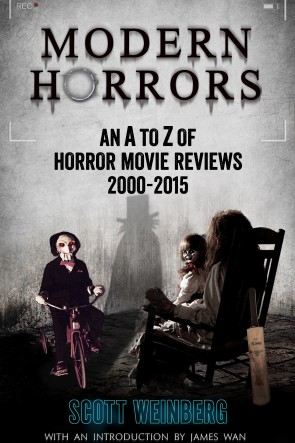Review: THE VISIT (2015){0}
M. Night Shyamalan does “found footage”
There is a scene early in The Visit where 15-year-old Rebecca (Olivia DeJonge) and her 13-year-old brother Tyler (Ed Oxenbould), as they are driven through a small town in Pennsylvania, make up stories about the different buildings that they see and the people that they imagine inside them. This is the first time the siblings have ever been to Masonville, Pennsylvania, or ever visited their grandparents ‘Nana’ (Deanna Dunagan) and ‘Pop Pop’ (Peter McRobbie) – from whom their mother Loretta (Kathryn Hahn) has been completely estranged for 15 years – and it is only human nature that the children should use invention to fill in the blanks of their knowledge.
For his eleventh feature, M. Night Shyamalan gets the viewer to play a similar game, as he feeds us partial narrative information, and then preys upon our imaginations to do half his work for him. Given the film’s title composed of a definite article and a common noun, and given the ‘found footage’ format (everything that we see purports to be from an intradiegetic video that budding documentarian Rebecca is making of her week-long stay with her newfound grandparents), viewers are primed from the outset to expect horror, but unsure exactly what kind of horror.
On the surface Nana and Pop Pop are a lovely, loving couple, if a little out of touch, but as the week goes by, their behaviour becomes more erratic and alarming to their young guests. Tyler wonders why Pop Pop keeps venturing furtively out to a shed, and what he might be doing in there. Rebecca worries about Nana’s strange nocturnal activities (vomiting, wandering about naked). And both are curious what there might be lurking down in the forbidden basement. The simplest explanation comes quickly from Pop Pop – “We’re old people” – and with their age come the all too real horrors of incontinence, dementia, decrepitude.
Yet Shyamalan teases us with a variety of other explanatory frames. When the children play hide and seek in the crawl space under the house, Nana joins in, scrabbling along with her long hair and disjointed movements that recall a ghost from J-horror. Nana is also a compulsive baker, and her insistence that Rebecca crawl into the oven to clean it rather obviously evokes the fairytale matrix of Hansel and Gretel – while later Tyler will be comparing her explicitly to Halloween‘s Michael Myers. Nana herself at one point tells a peculiar story about aliens and water, raising expectations of something like Shyamalan’s own Signs (2002), while Pop Pop has his own tales of seeing at night a white creature with yellowed eyes.
This being a Shyamalan film, viewers will be looking out for a twist – which is to say that many will also see it coming. Yet while Shyamalan tosses all manner of red herrings at the screen, and allows the tension to build and build towards a terrifying climax, here, as in his earlier Lady in the Water (2006), the writer/director seems far more preoccupied with the theme of storytelling itself – its uses and abuses, its power to deceive and to heal – than with the genre mechanics of his own story. Rebecca may inadvertently be documenting an unfolding nightmare (which, by coincidence, is probably what most viewers are hoping to see), but her intention is to use her own film to rewrite the damaged relationship between her mother and grandparents, and to fashion a reconciliation – and this aspect of the narrative runs in parallel to its more thrilling parts, as a sort of ghostly palimpsest.
“I want to do this for you,” Rebecca explains to Loretta of her amateur filmmaking, expressly acknowledging her mother to be a ‘classic narrative character’. If the adolescent girl will find herself increasingly trapped in a dark Grimms’ tale, she has been, from the start, on a mythic quest for the ‘elixir’ (her word) that will mend her mother – and mend herself too, although Rebecca’s aversion to mirrors means that she is unable to recognise her own deep-seated sense of anger and loss. The germ-phobic Tyler too comes with his own psychological block that goes back to a football failure from five years earlier that has led him to blame himself for their father’s departure. All these problems will find their resolution in Rebecca’s recorded and edited blend of cinéma vérité and make believe, of the rational and the mad, alongside the gothic tale of the grandparents, which features its own impostures and psychoses. Yet where The Visit falls down is in an indulgent coda that retells this multivalent story once again, only in an irksomely rapped form. In Rebecca’s interview-based film, everyone gets to bring their own take on what has happened – and Tyler’s take, it turns out, is where the true horror lies.
★★★








